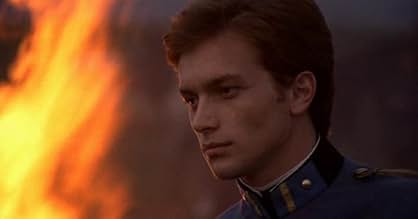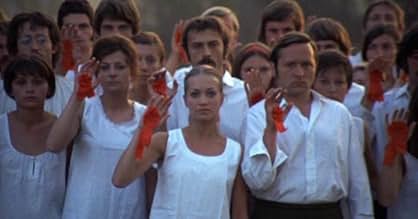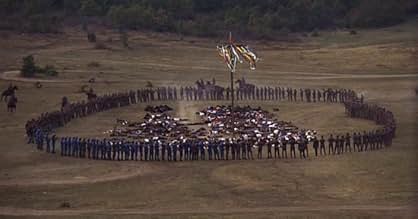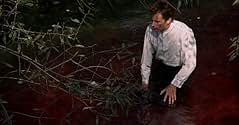Még kér a nép
- 1972
- 1h 27min
CALIFICACIÓN DE IMDb
6.7/10
2.1 k
TU CALIFICACIÓN
Agrega una trama en tu idiomaSet in the 1890s on the Hungarian plains, a group of farm workers go on strike in-which they face harsh reprisals and the reality of revolt, oppression, morality and violence.Set in the 1890s on the Hungarian plains, a group of farm workers go on strike in-which they face harsh reprisals and the reality of revolt, oppression, morality and violence.Set in the 1890s on the Hungarian plains, a group of farm workers go on strike in-which they face harsh reprisals and the reality of revolt, oppression, morality and violence.
- Premios
- 1 premio ganado y 2 nominaciones en total
- Dirección
- Guionista
- Todo el elenco y el equipo
- Producción, taquilla y más en IMDbPro
Opiniones destacadas
Note: This review was written in 2004.
Jancso's famous poetic film that was so much debated in our overly-politicized youth when it first appeared. A work flooded with music and singing, a continuous choreography-hymn to the revolution that wins the viewer overcoming rational resistance. Of course, the film is viewed very differently now in the years of a single world superpower than thirty years ago in the years of fermentation and hope. There is now a widespread disappointment about the film's issues, a skepticism about what it claims, and its optimistic finale is rather received with a sigh ...
The issue of the rebellion of oppressed peasants seems to belong to a very distant past, and the historical victory of the "people," where it happened anyway, did not evolve as its prophets dreamed of. It is also remarkable that the film seems to support a non-Soviet version of the revolution, where, as its leader states, "the land belongs only to those who cultivate it", meaning of course that it does not belong to the landowners - neither to the State, we conclude!
Also noteworthy are the religious connotations that (inevitably?) the revolutionaries give to their actions: after resisting the priests, as collaborators of Power, and after burning a church in a choreographic way, they set their own ritual: a People's "Sunday Prayer" a "confession and repentance" of the deceived villager who collaborated with the authorities and returns to the "People", a pagan funeral, etc. Obviously, at the time of the film (1972), all of these were part of the communist practice that tried to uproot the faith of the simple people, but also needed to devise ritualistic substitutes. Today, they are viewed as just another failed anti-Christian effort of a rigid ideological system.
Overall, Jancso's film is an enviable achievement of poetic cinema, where human characters are absent, since every person appearing is nothing more than a "bearer of ideology and history". With the continuous movement of the camera, the complete absence of interior scenes (the entire, absolutely entire, movie is filmed outdoors, in the endless Hungarian plain), music and dance, it captivates the viewer, apparently showing the way to directors who followed, like Bertolucci and Angelopoulos. Unfortunately the passing of time left its mark on the film copy and all its wonderful colors have degraded to a monochrome brownish. A film certainly worth the 1972 Cannes Film Prize.
Overall, Jancso's film is an enviable achievement of poetic cinema, where human characters are absent, since every person appearing is nothing more than a "bearer of ideology and history". With the continuous movement of the camera, the complete absence of interior scenes (the entire, absolutely entire, movie is filmed outdoors, in the endless Hungarian plain), music and dance, it captivates the viewer, apparently showing the way to directors who followed, like Bertolucci and Angelopoulos. Unfortunately the passing of time left its mark on the film copy and all its wonderful colors have degraded to a monochrome brownish. A film certainly worth the 1972 Cannes Film Prize.
In the book “1001 Movies You Must See Before You Die” eminent film critic Jonathan Rosenbaum wrote about RED PSALM being “…dazzling…awesome…ravishing…striking…it may well be the greatest Hungarian film of its time…”; conversely, Miklos Jancso'’s acknowledged masterpiece THE ROUND-UP (1965) – which I adore – is conspicuous by its absence in that singular pantheon. Besides, the late great film critic Raymond Durgnat wrote extensively about this film in his very last article published in 2002. Furthermore, Jancso' won the best direction prize at the Cannes Film Festival when Joseph Losey (whom I admire a great deal) was the President of the Jury and where RED PSALM was competing against such remarkable contenders as Robert Altman’s IMAGES, Harry Kumel’s MALPERTUIS, Peter Medak’s THE RULING CLASS and Andrei Tarkovsky’s SOLARIS! Why is it, then, that my star rating is such a lowly one?
There is no doubt in my mind that this is a key work in the director’s canon (which makes my underwhelmed reaction all the more painful to me) but, frankly, this is truly a case where form completely overpowers content or, to put it in the apposite layman’s terms, a film which can only be admired but not enjoyed. The main reason for this is that the entire running time (a relatively modest 81 minutes in PAL mode) is taken up by Jancso'’s obsession with politics and folklore with no space left for any real characters to emerge much less a discernible plot line. This would hardly be a problem in itself where it not for the fact that when somebody takes a break from the constant – and by now familiar – communal dancing marathons (which, thankfully, does mean that some of the typically stunning girls get to shed their clothing), they do so only to spout a litany of Communist diatribes which completely wear the viewer (and the film itself) down before long. Although Jancso'’s exuberant visual style always had a certain aloofness to it, I really didn’t connect at all with any of the characters or events depicted here. In fact, I’d go so far as to say that this is one time where the English subtitles (which, in themselves, are grammatically awkward and replete with spelling mistakes) distinctly felt like an intrusion and their verbosity detracted from the power of the meticulously composed images. Consequently, one’s enjoyment of the film as a whole suffers for it and given the generic, prosaic nature of the dialogue, I might well consider watching the film unsubtitled in the future! Amusingly enough, however, the Catholic prayer of Our Father is even blasphemously transformed into a Communist credo at one point.
Still, this is not to say that the film is completely worthless: the rebelling peasant farmers sing various songs (a couple of which are in English) that, while lyrically are merely propagandistic, are also melodically haunting. Given Jancso'’s penchant for lengthy, traveling sequence-shots (the film is said to contain a mere 26 in all!) which are, essentially, its true raison d’etre, some striking images can’t help but stand out, in particular the burning of a church by the peasants and their eventual massacre by the landowners’ army of defenders. Even more remarkable is Jancso' fusing his historical recreation with unexpected but decidedly welcome fantasy elements which sees dead people coming back to life with a kiss and, in an unheralded uproar to which nobody retaliates, an incensed peasant woman shoots several soldiers in quick succession single-handedly, etc.
As a result of my disappointing viewing of RED PSALM, I have decided to to take a sabbatical from Jancso' for now and postpone the three other films of his that I have in my possession to a later date (by which time, nevertheless, hopefully I would have acquired two more)…
There is no doubt in my mind that this is a key work in the director’s canon (which makes my underwhelmed reaction all the more painful to me) but, frankly, this is truly a case where form completely overpowers content or, to put it in the apposite layman’s terms, a film which can only be admired but not enjoyed. The main reason for this is that the entire running time (a relatively modest 81 minutes in PAL mode) is taken up by Jancso'’s obsession with politics and folklore with no space left for any real characters to emerge much less a discernible plot line. This would hardly be a problem in itself where it not for the fact that when somebody takes a break from the constant – and by now familiar – communal dancing marathons (which, thankfully, does mean that some of the typically stunning girls get to shed their clothing), they do so only to spout a litany of Communist diatribes which completely wear the viewer (and the film itself) down before long. Although Jancso'’s exuberant visual style always had a certain aloofness to it, I really didn’t connect at all with any of the characters or events depicted here. In fact, I’d go so far as to say that this is one time where the English subtitles (which, in themselves, are grammatically awkward and replete with spelling mistakes) distinctly felt like an intrusion and their verbosity detracted from the power of the meticulously composed images. Consequently, one’s enjoyment of the film as a whole suffers for it and given the generic, prosaic nature of the dialogue, I might well consider watching the film unsubtitled in the future! Amusingly enough, however, the Catholic prayer of Our Father is even blasphemously transformed into a Communist credo at one point.
Still, this is not to say that the film is completely worthless: the rebelling peasant farmers sing various songs (a couple of which are in English) that, while lyrically are merely propagandistic, are also melodically haunting. Given Jancso'’s penchant for lengthy, traveling sequence-shots (the film is said to contain a mere 26 in all!) which are, essentially, its true raison d’etre, some striking images can’t help but stand out, in particular the burning of a church by the peasants and their eventual massacre by the landowners’ army of defenders. Even more remarkable is Jancso' fusing his historical recreation with unexpected but decidedly welcome fantasy elements which sees dead people coming back to life with a kiss and, in an unheralded uproar to which nobody retaliates, an incensed peasant woman shoots several soldiers in quick succession single-handedly, etc.
As a result of my disappointing viewing of RED PSALM, I have decided to to take a sabbatical from Jancso' for now and postpone the three other films of his that I have in my possession to a later date (by which time, nevertheless, hopefully I would have acquired two more)…
9thao
Here is something you have never seen before. A war musical with dancing naked women, armed men, choreographed walking, communist folk songs and poetic settings.
The film is based on peasant uprisings in Hungary that occurred between 1980 and 1910. The style is like something from a poetic theater. People hardly talk and everything is very staged. You might even say fake. Well, I suspect the message of the film is in the style. It is fake because communism and its origin was fake. It was an Utopia based on a lie. Miklós Jancsó was a socialist but not a communist (most people confuse the two) and he was critical of the direction his country was taking (as can be seen in other films by him). Here he gets the communist government to finance a film that looks like a glorious praise of the origin of the party while the style is telling us that this is all a staged lie. Don't believe it, any more than you believe that all these scenes are a realistic account of what happened.
The music is brilliant. Folk songs, many probably used in the peasant uprisings. I also liked the staging and the poetic imagery, like how a stigmata wound in the hand turned into a red flower, which looks like a French Revolution rosette cockade pin. And how many will die only because of one shot fired. And the use of doves, as symbols of peace and harmony, was beautiful. And the naked women? I guess they represent the innocence and the beauty of the peasant, who in their ignorance believed in the promised land.
You might not enjoy this film if you watch it as a straight communist propaganda. Watch it as a clever Trojan horse, pretending to be one thing while smuggling critical social commentary and you might get much more out of it. I for one liked this film for its bravery, its message, poetic beauty and for being like no other musical out there.
The film is based on peasant uprisings in Hungary that occurred between 1980 and 1910. The style is like something from a poetic theater. People hardly talk and everything is very staged. You might even say fake. Well, I suspect the message of the film is in the style. It is fake because communism and its origin was fake. It was an Utopia based on a lie. Miklós Jancsó was a socialist but not a communist (most people confuse the two) and he was critical of the direction his country was taking (as can be seen in other films by him). Here he gets the communist government to finance a film that looks like a glorious praise of the origin of the party while the style is telling us that this is all a staged lie. Don't believe it, any more than you believe that all these scenes are a realistic account of what happened.
The music is brilliant. Folk songs, many probably used in the peasant uprisings. I also liked the staging and the poetic imagery, like how a stigmata wound in the hand turned into a red flower, which looks like a French Revolution rosette cockade pin. And how many will die only because of one shot fired. And the use of doves, as symbols of peace and harmony, was beautiful. And the naked women? I guess they represent the innocence and the beauty of the peasant, who in their ignorance believed in the promised land.
You might not enjoy this film if you watch it as a straight communist propaganda. Watch it as a clever Trojan horse, pretending to be one thing while smuggling critical social commentary and you might get much more out of it. I for one liked this film for its bravery, its message, poetic beauty and for being like no other musical out there.
The Red Psalm is an almost unapproachable film these days; the filmmaking practises of today have made us western viewers forget how to watch films that are not made to entertain.
The Story is simple enough: the Red Psalm depicts the rise and fall of a peasant revolt in the earliest days of socialism. The focus is on the reasons why it doesn't succeed, rather than on characters and plot. In fact, to use words like "character" and "plot" in connection to the Red Psalm would be misguiding.
This is an example of a film where message dictates the cinematic language of the film. It is not meant to be a realistic depiction of the living conditions of the peasants in the late 19th century. Instead it tries to depict realistically the reasons and causes of such tragedies in general. The film is full of what some people would call "gaffes", but they are there just because it does not matter if the actor has his wristwatch on or whether the guitar has nylon strings. That kind of authenticity is only superficial.
All in all, The Red Psalm is an ultimately challenging viewing recommended for everyone who is looking for alternatives to Hollywood pap. It demands the attention of the viewer throughout, because it is not generic in any way. Yet it is not without its flaws. It is extremely slow paced, full of folk dancing and saturated with socialist propaganda. Yet features like Jancso's free flowing camera should interest at least wannabe filmmakers to this challenging and complex film.
The Story is simple enough: the Red Psalm depicts the rise and fall of a peasant revolt in the earliest days of socialism. The focus is on the reasons why it doesn't succeed, rather than on characters and plot. In fact, to use words like "character" and "plot" in connection to the Red Psalm would be misguiding.
This is an example of a film where message dictates the cinematic language of the film. It is not meant to be a realistic depiction of the living conditions of the peasants in the late 19th century. Instead it tries to depict realistically the reasons and causes of such tragedies in general. The film is full of what some people would call "gaffes", but they are there just because it does not matter if the actor has his wristwatch on or whether the guitar has nylon strings. That kind of authenticity is only superficial.
All in all, The Red Psalm is an ultimately challenging viewing recommended for everyone who is looking for alternatives to Hollywood pap. It demands the attention of the viewer throughout, because it is not generic in any way. Yet it is not without its flaws. It is extremely slow paced, full of folk dancing and saturated with socialist propaganda. Yet features like Jancso's free flowing camera should interest at least wannabe filmmakers to this challenging and complex film.
I consider the discussion about art to be a meaningless waste of energy, so I will let others sort out whether this is 'great art' or not. Whether or not this is a cinematic triumph against plot and character though, as championed by many, will invariably depend on your definition of cinematic. It does not meet mine, at least my definition of richly cinematic worth leaving the mind behind.
Here's the setup: it is apparently the 1890's, the place is a stretch of Hungarian plains rolling in the distance. A village of farmers has gone into a strike, with a battle being fought over their soul and minds. Now and then newcomers emerge from nowhere, young intellectuals who give spirited lectures on Engels and socialist theory, priests with their sermons and rites, soldiers of some distant , oppressive authority.
The people are by turns confused and spirited, bold and despairing. They lash out against each other, burn a church. They pray and hold court. Now and then they sing and dance about their woes, stabbing who they see as more privileged. Soldiers swell their revolutionary ranks, then break out and shoot them. It all happens in circles in that same featureless plain.
The allegory is stark, what the Czech had been for years leveling against Nazis: covert attack on the hypocrisy and tyranny of a distant state, by celebrating betrayed hopes and idealism.
That's all fine, but for one factor.
We see a lot of upheaval, a lot of pain turned into song. But we are not tethered into human soul for any of it. We never know any of these people except schematically, as actors on a stage. A disembodied camera liturgically roams and roams around these faces, but we have no entry into the soft underbelly of actual lives.
It is a matter of presentation. In The Red and the White, Jancso solved this by first ushering us into a world at war, with stakes and limits, with blood coursing through people. So when he abstracted, we were moved the right distance away from the aimless bloodspill to view a more cosmic grind.
Here the abstraction is all done before we get there. The abstract world is already in place and does not transform again; the sparse setting, the visitations, recitations and ceremonies. You don't make the jump to an ecstatic view, and it has to be you.
So the effect is like being taken to a room where people are calmly sitting with eyes closed and told this solemn air that you see is meditation. How do you know they're not sleeping?
Here's the setup: it is apparently the 1890's, the place is a stretch of Hungarian plains rolling in the distance. A village of farmers has gone into a strike, with a battle being fought over their soul and minds. Now and then newcomers emerge from nowhere, young intellectuals who give spirited lectures on Engels and socialist theory, priests with their sermons and rites, soldiers of some distant , oppressive authority.
The people are by turns confused and spirited, bold and despairing. They lash out against each other, burn a church. They pray and hold court. Now and then they sing and dance about their woes, stabbing who they see as more privileged. Soldiers swell their revolutionary ranks, then break out and shoot them. It all happens in circles in that same featureless plain.
The allegory is stark, what the Czech had been for years leveling against Nazis: covert attack on the hypocrisy and tyranny of a distant state, by celebrating betrayed hopes and idealism.
That's all fine, but for one factor.
We see a lot of upheaval, a lot of pain turned into song. But we are not tethered into human soul for any of it. We never know any of these people except schematically, as actors on a stage. A disembodied camera liturgically roams and roams around these faces, but we have no entry into the soft underbelly of actual lives.
It is a matter of presentation. In The Red and the White, Jancso solved this by first ushering us into a world at war, with stakes and limits, with blood coursing through people. So when he abstracted, we were moved the right distance away from the aimless bloodspill to view a more cosmic grind.
Here the abstraction is all done before we get there. The abstract world is already in place and does not transform again; the sparse setting, the visitations, recitations and ceremonies. You don't make the jump to an ecstatic view, and it has to be you.
So the effect is like being taken to a room where people are calmly sitting with eyes closed and told this solemn air that you see is meditation. How do you know they're not sleeping?
¿Sabías que…?
- TriviaIncluded among the "1001 Movies You Must See Before You Die", edited by Steven Schneider.
Selecciones populares
Inicia sesión para calificar y agrega a la lista de videos para obtener recomendaciones personalizadas
- How long is Red Psalm?Con tecnología de Alexa
Detalles
- Tiempo de ejecución
- 1h 27min(87 min)
- Mezcla de sonido
- Relación de aspecto
- 1.37 : 1
Contribuir a esta página
Sugiere una edición o agrega el contenido que falta





















